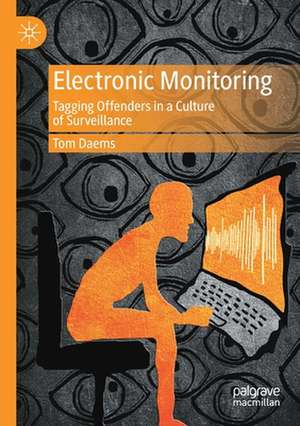Electronic Monitoring: Tagging Offenders in a Culture of Surveillance
Autor Tom Daemsen Limba Engleză Paperback – 2 dec 2020
| Toate formatele și edițiile | Preț | Express |
|---|---|---|
| Paperback (1) | 409.43 lei 6-8 săpt. | |
| Springer International Publishing – 2 dec 2020 | 409.43 lei 6-8 săpt. | |
| Hardback (1) | 415.02 lei 6-8 săpt. | |
| Springer International Publishing – 2 dec 2019 | 415.02 lei 6-8 săpt. |
Preț: 409.43 lei
Nou
Puncte Express: 614
Preț estimativ în valută:
78.34€ • 85.37$ • 66.02£
78.34€ • 85.37$ • 66.02£
Carte tipărită la comandă
Livrare economică 23 aprilie-07 mai
Preluare comenzi: 021 569.72.76
Specificații
ISBN-13: 9783030340414
ISBN-10: 3030340414
Pagini: 86
Ilustrații: IX, 86 p. 1 illus.
Dimensiuni: 148 x 210 x 10 mm
Greutate: 0.14 kg
Ediția:1st ed. 2020
Editura: Springer International Publishing
Colecția Palgrave Pivot
Locul publicării:Cham, Switzerland
ISBN-10: 3030340414
Pagini: 86
Ilustrații: IX, 86 p. 1 illus.
Dimensiuni: 148 x 210 x 10 mm
Greutate: 0.14 kg
Ediția:1st ed. 2020
Editura: Springer International Publishing
Colecția Palgrave Pivot
Locul publicării:Cham, Switzerland
Cuprins
1. Electronic Monitoring in a Culture of Surveillance.- 2. Functions of Electronic Monitoring: A to H.- 3. Functions of Electronic Monitoring: I to W.- 4. Defamiliarizing Electronic Monitoring.
Recenzii
“There are not enough books on electronic monitoring (EM) technologies and their uses in probation and prison contexts, so this is a welcome contribution. … Clear explanations of EM technologies are provided to ensure readers have a decent understanding of what is being discussed … . Daems is multi-lingual and incredibly well read, demonstrating a capacity for synthesising theoretical insights and international literatures into this short book in a way that is accessible and engaging.” (Hannah Graham, Probation Journal, Vol. 69 (1), 2022)
“Daems impressively manages to grasp the topic of EM in its entirety and explains it in a very understandable way. The book could be of particular interest to people who are interested in the topics of supervision and penology.” (Melanie Schorsch, KULT_online - Review Journal for the Study of Culture, Issue 62, November,2020)
“The book is … an easy and quick read. … It is enough to make one think and ponder. … I strongly recommend this book, for its style, creativity and thought-provoking nature. I had the impression that my thoughts on electronic surveillance, although the fruit of many years of legal and empirical research, had been spontaneously reshuffled and restructured. I also felt that the rationale behind 20 years of French EM developments appeared more clearly.” (Martine Herzog-Evans, Journal of Probation, June 1, 2020)
“Daems impressively manages to grasp the topic of EM in its entirety and explains it in a very understandable way. The book could be of particular interest to people who are interested in the topics of supervision and penology.” (Melanie Schorsch, KULT_online - Review Journal for the Study of Culture, Issue 62, November,2020)
“The book is … an easy and quick read. … It is enough to make one think and ponder. … I strongly recommend this book, for its style, creativity and thought-provoking nature. I had the impression that my thoughts on electronic surveillance, although the fruit of many years of legal and empirical research, had been spontaneously reshuffled and restructured. I also felt that the rationale behind 20 years of French EM developments appeared more clearly.” (Martine Herzog-Evans, Journal of Probation, June 1, 2020)
Notă biografică
Tom Daems is Associate Professor at the Leuven Institute of Criminology, KU Leuven, Belgium. Previously he was Assistant Professor in Criminology and Sociology of Law at Ghent University. He has been a visiting scholar at the Universities of Edinburgh and Nottingham, as well as at the London School of Economics.
Textul de pe ultima copertă
This book offers a systematic, sociological and penological exploration of the most up-to-date uses of electronic tagging (also known as electronic monitoring). With increasingly overcrowded prisons, electronic tagging has been proposed as an alternative form of punishment, and interest in this topic is growing throughout Europe. Current debates and research have often been limited to policy evaluation and effectiveness, whereas Electronic Monitoring examines the brand of punishment from a social-science perspective. This book explores the uses and history of electronic tagging, and draws upon the work of the Dutch criminologist Willem Nagel to reflect upon this form of punishment by examining its functions and dysfunctions. It speaks to those interested in criminal justice reform, surveillance, penology and penal innovation and probation.
Caracteristici
Examines electronic tagging/monitoring from an original perspective Contributes to the field of research on electronic tagging as an alternative form of punishment Speaks to academics and practitioners interested in alternative sanctions and probation
